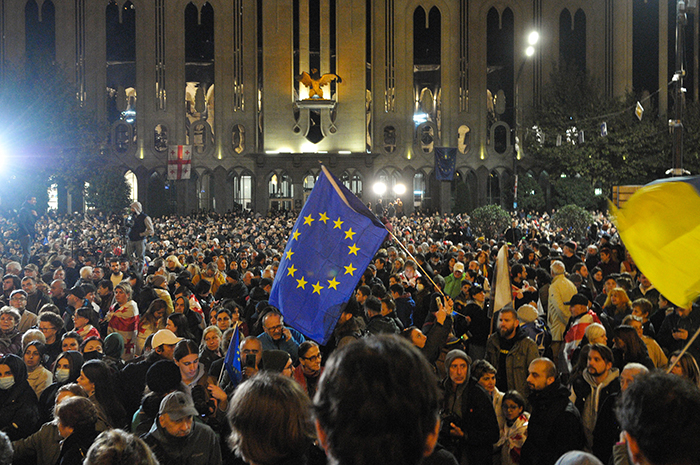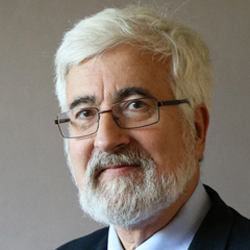Interviews
30 October 2024
Parliamentary Elections in Georgia: Between European Aspirations and Russian Pressures?

Georgian voters went to the polls on October 26, 2024, to elect a new Parliament. After a tense campaign, the ruling party, “Georgian Dream,” emerged victorious. The pro-Western opposition, however, claims that the party, which is seen as closer to Moscow, engaged in massive electoral fraud and refuses to recognise its victory. Following massive protests against a law labelled as pro-Russian on “foreign agents,” this episode marks another upheaval in the crisis that has gripped the country for over forty years, casting doubt on Georgia’s prospects for joining the European Union.
What does the election result signify? How can Tbilisi’s ambiguity toward Russia and the European Union be explained? Insights from Jean de Gliniasty, research director at IRIS, former French ambassador to Russia, and specialist in Russia and its regional environment.
The announcement of the results of the parliamentary elections in Georgia has been overshadowed by accusations of massive fraud from the pro-Western opposition against the leading party, labelled as pro-Russian. What are these accusations based on? How are they supported by international observers?
The Georgian population is divided, and accusations of electoral fraud are a recurring issue during elections. This time, these accusations have been documented by approximately 500 observers mandated by the Organization for Security and Co-operation in Europe (OSCE), which particularly criticised the use of “administrative resources” by the ruling party, “Georgian Dream,” which won the elections with 54% of the vote. Other international organisations (such as Transparency International) and local groups (like Ma Voix) also reported fraud, including ballot stuffing, pre-filled ballots, “borrowing” of ID cards, and acts of violence. In some polling stations, vote recounts were necessary.
However, the widespread use of voting machines with automatic ballot counting helped limit fraud, as noted by the OSCE mission. Overall, the mission stated that the observed irregularities did not undermine the election’s outcome. It is worth noting that these results are not significantly different from those of the previous parliamentary election in October 2020, where “Georgian Dream” similarly secured nearly half the votes and a majority of 90 out of 150 seats, facing a fragmented opposition.
In reality, while the country is united in its aspiration to move closer to the European Union, it is deeply divided on the issue of relations with Russia. The “Georgian Dream” party advocates maintaining calm relations with Moscow, while the opposition calls for a decisive break and a radical shift toward the West.
Georgia, as reflected in this election, appears to be at the centre of the struggle for influence between the EU and Russia. How can Georgia’s ambiguous position towards these two powers, particularly since gaining independence, be explained?
Some Georgians, traumatised by the 2008 war with Russia and the secession of Abkhazia and South Ossetia, aim to maintain a cautious relationship with their powerful neighbour. They are acutely aware that neither NATO nor the European Union would send troops to defend them in the event of renewed hostilities. Economic ties with Russia remain significant, not least due to Russian migrants fleeing mobilisation for the war in Ukraine. These dynamics contributed to Georgia’s impressive economic growth rates of over 10% in 2022 and 2023.
Bidzina Ivanishvili, the leader of “Georgian Dream” and a wealthy oligarch with business interests in Russia employing many Georgians, campaigned on the idea of closer ties with the European Union without severing relations with Russia. He labelled the opposition as the “party of war,” invoking fears of a Ukrainian-style scenario. Additionally, he presented himself as a defender of “traditional values,” resonating with a significant portion of the electorate.
On the other hand, the opposition, represented by four parties advocating closer alignment with Europe, failed to produce a standout leader. Former President Mikheil Saakashvili remains in prison on various charges, and his party, the United National Movement, led by Tina Bokuchava—who appeared alongside the flags of Georgia, the EU, NATO, and the United States to signal a clear pro-Western stance—came in third place. The most prominent national figure of the pro-European opposition is Salome Zourabichvili, the current president who has distanced herself from Georgian Dream. She condemned the election as a “total falsification” and addressed protesters rallying outside Parliament. However, her position as president prevented her from actively participating in the campaign or attempting to unite the opposition against Georgian Dream. She is likely to take on this role after leaving office later this year, as she cannot seek re-election due to changes in electoral rules, with the president now being chosen by Parliament.
The European Union suspended Georgia’s accession procedure in December 2023. Laws modelled on Russia’s “foreign agents” legislation and another targeting “LGBT propaganda” violated several of the 12 conditions set for initiating accession talks. The process is now frozen and likely to remain so for some time. Georgian Dream, by blaming external factors for this stalemate, absolves itself of responsibility for the rupture.
In summary, this election marks a victory for Russia, which continues to gain influence in Georgia.
How can we explain the reluctance of Georgia, as well as other post-Soviet countries like Moldova, to translate their desire to join the European Union into electoral outcomes?
The European model remains highly attractive to a significant portion of the youth and society as a whole, but paradoxically, the invasion of Ukraine has given many pause for thought. Initially, the war prompted governments in former Soviet republics (Moldova, Georgia, Armenia, and Central Asia) to take advantage of Russia’s focus on Ukraine to assert more independence and gain room to manoeuvre, including moving closer to the European Union.
However, the ongoing war, the strengthening of Russian positions, and the perception that Russia will not lose and must be reckoned with in the future have led to caution. This is particularly true given the continued presence of Russian troops in Moldova (Transnistria) and Georgia (Abkhazia and South Ossetia). Adding to this are the ties inherited from the Soviet era, economic relationships, the widespread use of the Russian language, and Moscow’s influence campaigns, leaving these societies quite divided.
After an initial period of euphoria, the war in Ukraine is now prompting Moldovans and Georgians to adopt a more cautious approach.

